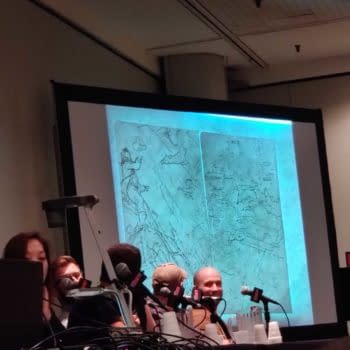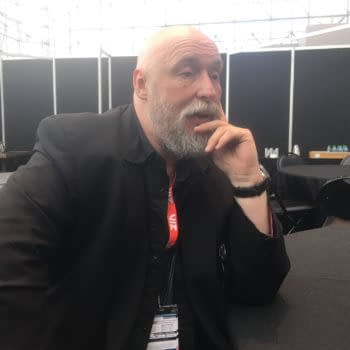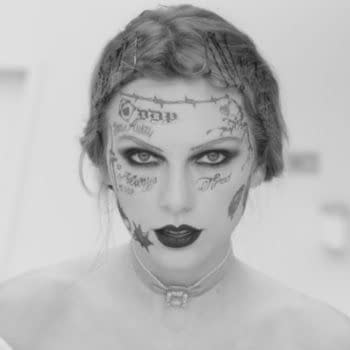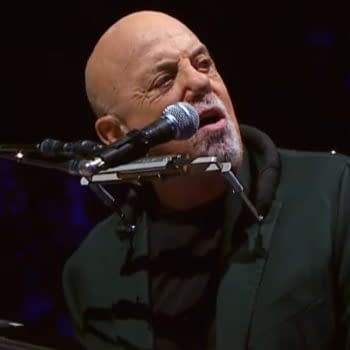Posted in: Anime, Conventions, Events, Netflix, NYCC, Preview, streaming, Trailer, TV | Tagged: anime, bleeding cool, cable, Castlevania, interview, netflix, NYCC, NYCC 2019, season 3, streaming, television, tv, warren ellis
"Castlevania": Warren Ellis Talks Adapting Video Game, Working with Netflix, Dracula & More [INTERVIEW]
Noted author and Castlevania creator Warren Ellis took some time out from New York Comic Con (NYCC) 2019 to sit down with Bleeding Cool to discuss the show and the method behind crafting what many consider to be the finest video game adaptation of all time.
For those new to Castlevania or not completely caught up on the first two seasons on Netflix, spoilers ahead…
Bleeding Cool: You're no stranger to working with previously established mythologies. What was it like working with Castlevania and how did you decide what part of its existing canon you wanted to put your unique spin on?
Warren Ellis: I have never played any of the games, never even looked at them. I wrote this entire show using Wikipedia and fanpages so I wasn't really aware of any of that. When I was originally contacted, some 10 years ago, Kevin Kolde, our Executive Producer, pointed me at a specific part of the game's sequence that he thought would make a good film (Note: This is the game Castlevania III: Dracula's Curse). In absence of a better idea I dug in there and started pulling things out and pulling stuff out from other games and making some stuff up to fill it out.
It's hard to think in terms of a mythos or canon when you're talking about 8-bit sprites jumping around under one sentence. It's not like there's a lot of textual material there to dig at. I did what I could. I mostly went to the things it put me in mind of rather than the thing itself. Once I did enough reading I realized how similar it was to the Hammer Horror movies that I grew up with. Many of which were set in Eastern Europe and many of which featured vampires. At some point I realized I was just doing my own Hammer Horror film.
BC: Dracula, especially in the first season when he is with his wife and again much later when he is dealing with his lieutenants, almost comes off as a sympathetic figure. Is that something that came out of working with the character, how do you view Dracula?
WE: For me it was absolutely vital. Christopher Lee (Note: In the Hammer Horror films) as that stentorian, almost alien Dracula, who has clearly killed people, was a lot of fun don't get me wrong and hugely influential on all of the material but I needed something else. Every person in the show needed to be an actual, functioning person. That had to go double for Dracula.
You don't understand the stakes until you understand the mood and the emotional condition. I was trying to make the whole thing a little bit more richer. Of course once we cast Graham McTavish as Dracula my work was done. He has such a rich, emotional, warm tenor to his voice and his performance that you can't help but wonder what happened to this man to get him to this place and you can't but wonder what he's hiding.
BC: Sypha Belnades is my favorite character. Her work with the Speakers, in preserving knowledge and geeking out over the library, seemed to continue the themes of Dracula's wife trying to bring science and medicine to the people who ultimately murdered her for it. Was this at all an intentional continuation?
WE: Not continues the work so much as they're both coming from the same place. The thing is set in the 1400s, it's the Dark Ages in a lot of places. You're talking about Enlightenment and improving lives through knowledge. They're both bringing light.
BC: You've spoken other places about how much you enjoy working with the voice cast on this show and that you will even rewrite lines of dialogue for them on the spot. Now that you are writing the show with that in mind, how has that changed what you write and the process for deciding on lines of dialogue?
WE: You can name any actor on the show and I can tell you how I have changed writing their character because of their performances. Each one has shown me something new that I have either folded into the writing or has caused me to write the character in a different way. It's a terrible thing to fall in love with your actors but when they are this good, and bringing so much, you'd be an idiot not to take it with you and fold it into writing.
BC: Why do you say it is a terrible thing to fall in love with your actors?
WE: Then you just start writing for your actors and thinking of fun things for them to do. You lose what it was that attracted them to the project. Each of these actors came to us because they liked the scripts and we want to keep on entertaining them.
BC: Every show must believe that it has a great voice cast but the Castlevania one is truly something special. How much input did you have in bringing this together?
WE: Me and Kevin Kolde and Meredith Layne, our Casting Director, all discussed who we wanted and who was available. Meredith is great at bringing in people we would not have thought of. I'm involved in almost all aspects of the show which is weird for me going from someone who sits in a box, types, and emails scripts to being involved with a lot of different people.
I speak with our composer as well, Trevor Morris, and suggest probably extremely annoying things I'd like to try. It has been absolutely fascinating. I was nervous at first as I had no idea what I was doing but now I just have almost no idea what I'm doing so there's been a progression. It's what I love most about the act of writing, which is that it is something new every day. I've actually really loved this entire experience.
BC: Now that you have involved yourself with every aspect of a show, is there a chance that we will see an original Warren Ellis idea as a show any time soon?
WE: God only knows. It is absolutely something I'd like to do at some point but if it does not work out then this has been fun enough.
BC: Can you talk a little about the creation of the character Godbrand from season two, since he is not based on any existing character?
WE: I found a name in the canon, Mathias Cronqvist, which I kind of liked and wanted to use but was told I couldn't, at least not in the way I wanted to because Konami see it as their job to stop me going completely insane and trashing their property. Very, very rarely will they draw a hard line but they did. By that point I'd already fallen in love with the idea of a vampire viking.
I was in northern Norway on a tech retreat, an AI conference, in the same hotel that the film Ex Machina was shot, and down the road, there was a village called Godbrand. Spelled slightly differently, but that's where the name comes from.
BC: Do you think he actually makes longboats out of human skin or is that something he just says that he is going to do?
WE: Oh, I don't think Godbrand lies. I think the terrible thing about Godbrand is that he has no filters. He wouldn't think of lying. He has done all of those things. If Peter Stormare hadn't agreed to voice the character then I'd have been stuck because I was writing it with his voice. It was the reverse of what usually happens, he did not give me that, I wrote that for him.
BC: Did Peter read this and ask if this was really what you thought of him?
WE: Honestly I don't even think he knew that the microphones were on. He just came in and ranted and raved for a few hours, clearly had a hell of a time, and left. Sometimes that is just how you want to be.
BC: What has your experience been working with Netflix?
WE: I began working with Netflix when it was still very much the Wild West. My relationship with our producers there has been wonderful. They brought us in knowing they would pay us for what it was we were going to do. On season two we got maybe five notes in an email.
These came with a message that said "here's some thoughts, if they're not useful then throw them away. See you next year." They've been completely hand's off. We have had what I believe is the perfect Netflix experience. We told them what the show was, they said "yes, we would like that, see you when it's done."
BC: Do you get more restrictions from Konami?
WE: We get notes from Konami, and they've been useful, but not in terms of restriction so much as these are people who have lived with the canon for much longer than I have so they have opinions and often they have actual facts that I was not aware of. It's not as if I sighing deeply when I get the notes from them. They have been very helpful.
BC: What did Kieron Gillen call Castlevania? The Vampire Platform Game?
WE: Vampire Jump Game! He brainfarted when we were doing a panel together at Thought Bubble. We get to discussing Castlevania and it was Vampire Jump Game and it's been Vampire Jump Show ever since in my house.
BC: The visuals of the show are incredible, especially the fight scenes. How involved are you with what they will look like on screen?
WE: Sam Deats is our director, Adam Deats is our special effects supervisor. We send a lot of material around but at the end of the day, visually it is Sam's show and his fantastic team of artists. I've given them notes, such as about the characters, but I will not take credit for any of the visuals. Even the sketches and prototype artwork are amazing.
I've often said that if I could show people a twentieth of what I am exposed to each day they'd just fall down from the sheer beauty of what is turned out every day without thinking about it. If I've got specific visuals in mind I'll tell them but quite often I'll say that this sequence is a couple of minutes long and it needs to be this this and this, go nuts.
I'm creating the space for them to do whatever the hell they want and that is when they get seriously innovative and magical. It makes me feel better about the things I have done to them such as destroying a town with a teleporting vampire castle. That sequence, I think, nearly killed them.
BC: The first season was written quite a while ago but season two features Dracula working with his lieutenants and has much time spent on politics and backstabbing. How did you arrive at that premise?
WE: Once you've got a mad old goat in a castle who wants to declare war then you've got a war court and then it's Shakespeare. Right away you're split between the court and the country which means you immediately have to thicken up that cast and you have to get heavy into at least a sketch of Medieval politics. Backstabbing, treachery. The whole Shakespearean thing seemed to be the obvious pull. I had to trawl back through Wikipedia to pull my cast from that, which gave us Hector and Carmilla.
Originally it was going to be a four episode second season when Kevin called me, told me to stop writing, and said "I want to go back to Netflix because I think you're compressing too much." I sat down with Netflix, they asked how many episodes I'd like. I said eight would be nice. They said "done, see you next year."
BC: Do you ever see Trevor Belmont becoming the classic hero type? The first time we see him he's down in the dumps and wants nothing to do with any of this until you present him with this opportunity.
WE: This is one thing I actually can take credit for. Richard Armitage as Trevor was my idea because he always plays the classical hero type. I remember seeing him on his very first episode of Spooks, where he's just been popped out of a Russian jail. They buy him some chips on the way back to the office, before he meets the actual protagonist of the show, who he offers a chip to in the funniest, most offhand way. I thought that I'd never seen Richard even try to be funny before. That was it.
Trevor's got that thing in him because Richard has got that thing in him, that he can subvert the classical actor thing. He can still achieve those notes but he can do it in a way that completely overturns what we expect from the classic hero. I don't know that Trevor will ever be that because I am too interested in what Richard can do with that and I've never been that interested in classical heroes. There is this hero type in picaresque literature where the character is given one opportunity after the next to be the hero and keeps managing to mess it up.
Seasons 1 and 2 of Castlevania are currently streaming on Netflix, with 10 episodes of Season 3 on the way (no final release date has been announced). Thank you to Warren Ellis for taking the time to speak with us.
Additional reporting and image by Adi Tantimedh.














